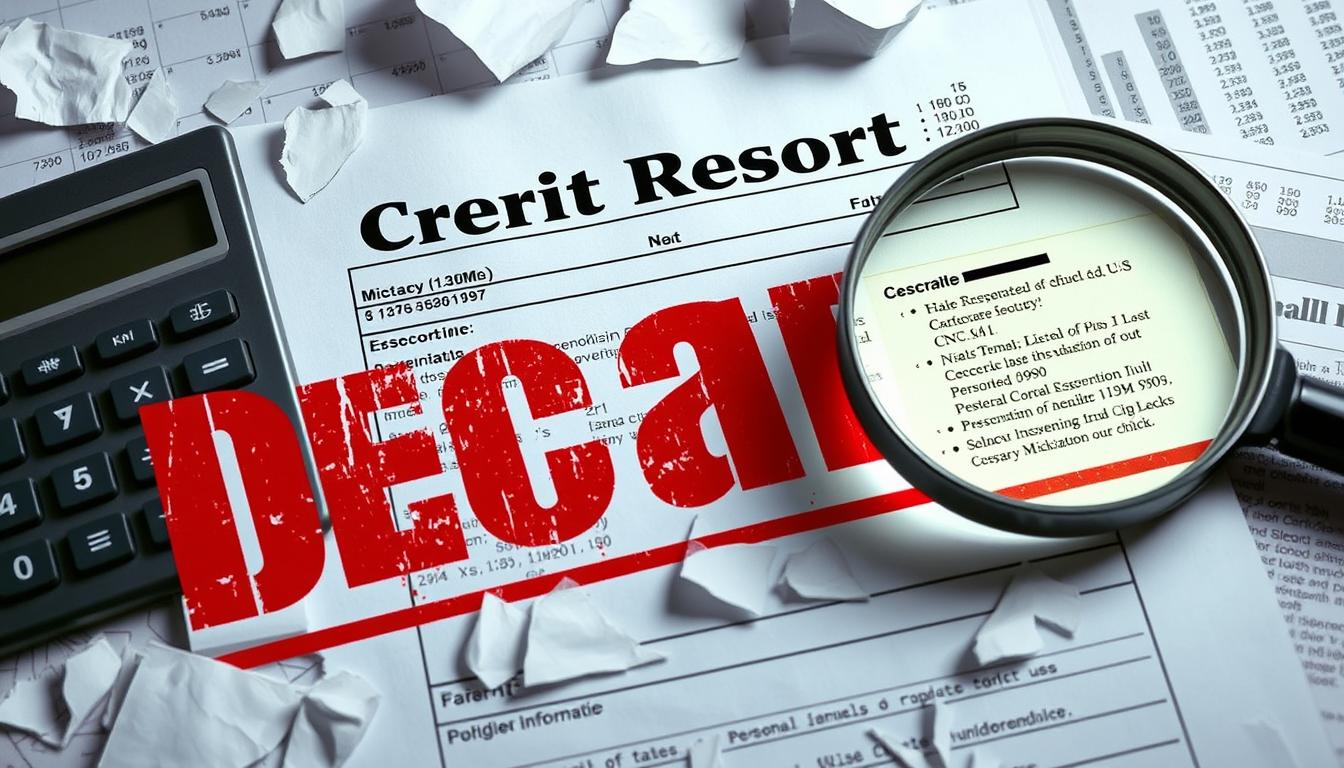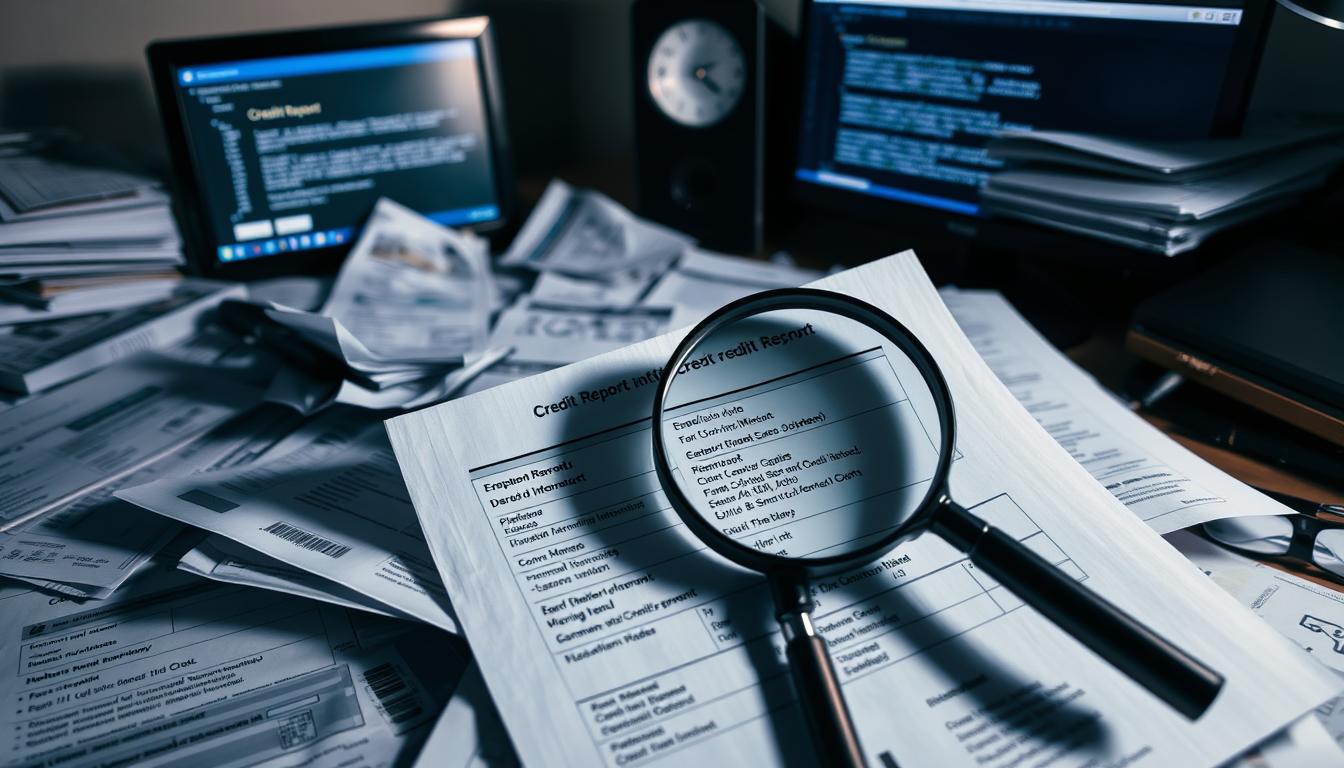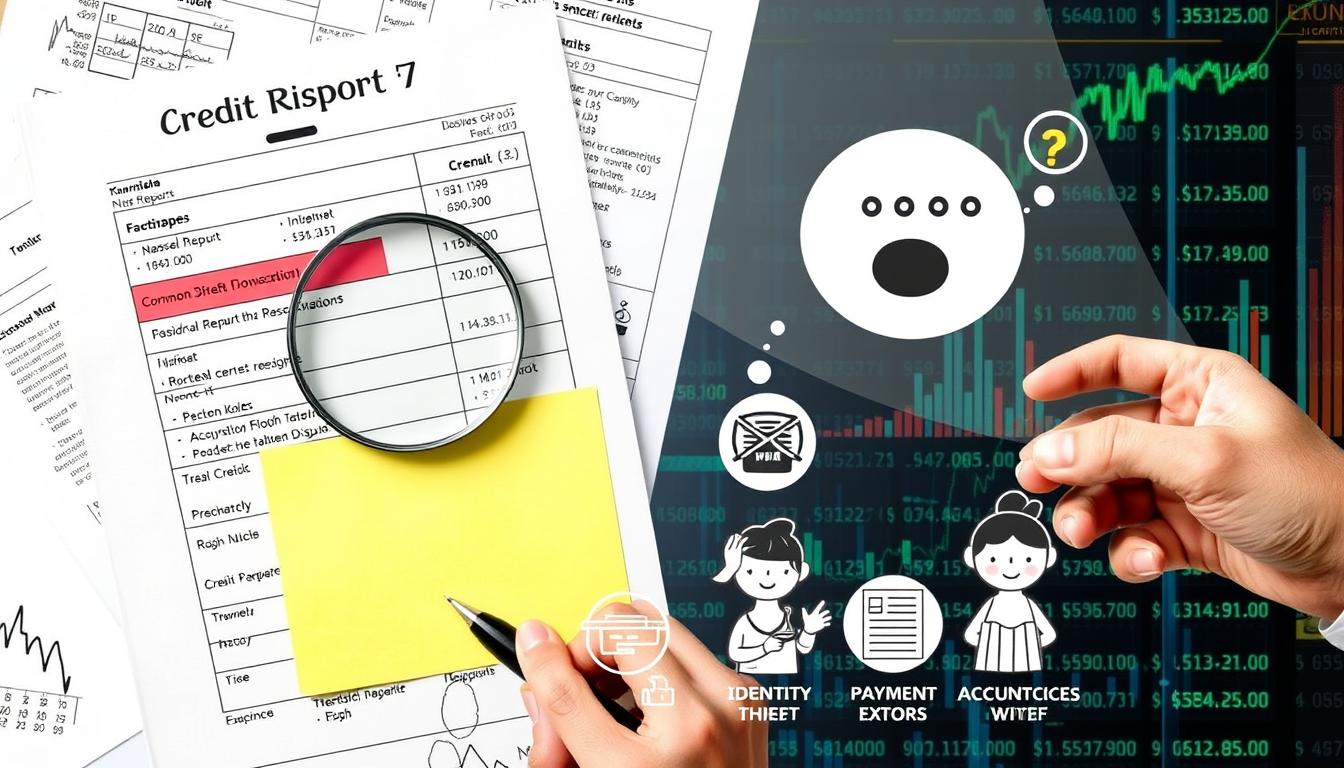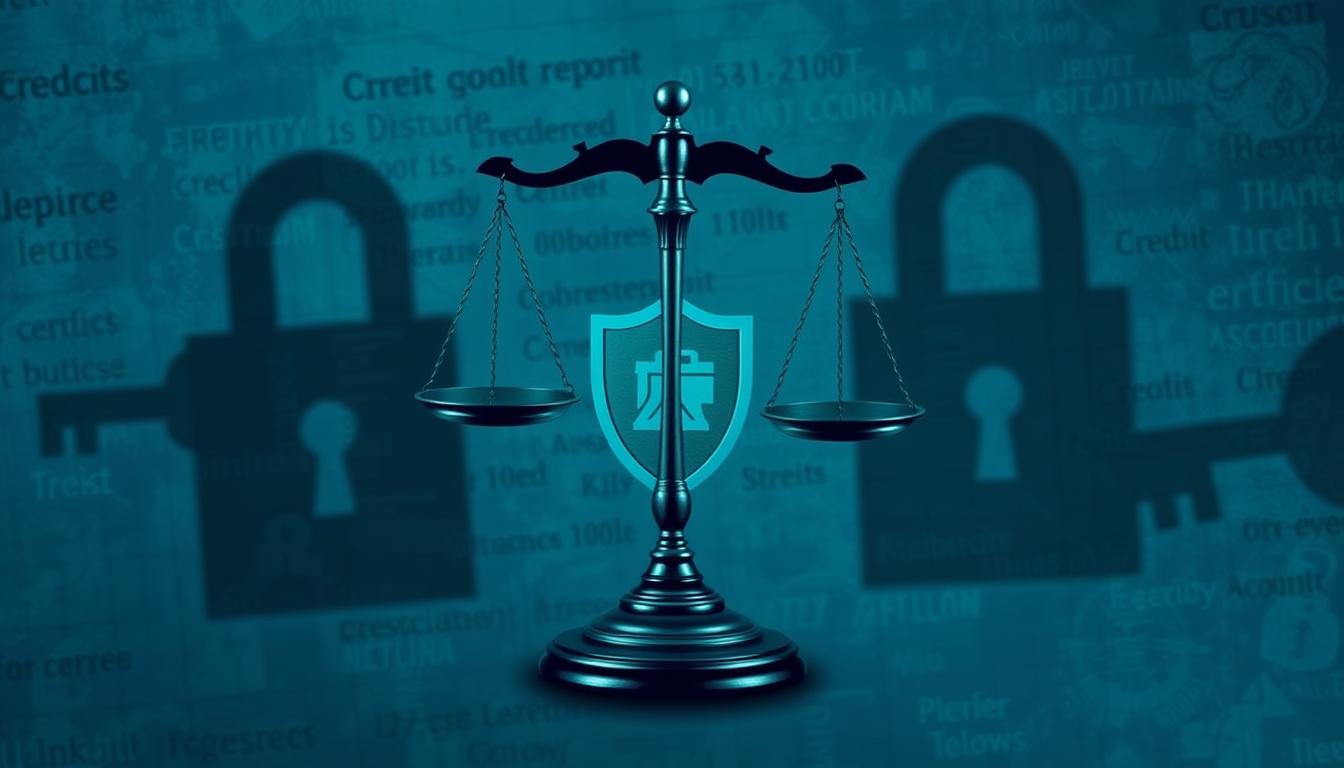A healthy credit profile is vital for financial success. It affects loans, rentals, and job opportunities. Credit report errors can harm your financial progress and reputation.
These mistakes may lead to higher interest rates and denied applications. This article explores common credit dispute reasons. We’ll guide you through addressing these inaccuracies.
Key Takeaways
- Understand the different types of credit report errors, from incorrect personal information to unauthorized accounts.
- Learn how to identify and challenge inaccurate payment history entries, outdated negative information, and duplicate credit accounts.
- Discover the potential consequences of unresolved credit report mistakes and how to protect your financial well-being.
- Gain insight into the credit dispute process, including drafting effective dispute letters and navigating the credit bureaus’ resolution procedures.
- Empower yourself with the knowledge and tools to maintain a accurate, up-to-date credit report and safeguard your financial future.
Understanding Credit Report Errors
Credit reports play a vital role in your financial health. However, they aren’t always accurate. Credit report errors happen more often than you might expect. These mistakes can range from simple typos to serious incorrect credit information.
Knowing the types of errors and their effects is crucial. This knowledge helps you in addressing credit report inaccuracies effectively. It’s the first step towards protecting your financial well-being.
Types of Inaccuracies on Credit Reports
Credit reports can contain a variety of errors, including:
- Incorrect personal information, such as misspelled names or outdated addresses
- Accounts that don’t belong to you, either due to identity theft or clerical errors
- Incorrect payment history, with late or missed payments incorrectly reported
- Outdated negative information, such as closed accounts or paid-off debts that remain on the report
- Duplicate or merged credit entries, where the same account is listed multiple times
Potential Consequences of Credit Report Mistakes
Inaccurate credit information can have serious consequences, including:
- Negatively impacting your credit score, making it harder to get approved for loans, credit cards, or even rental applications
- Limiting your ability to secure favorable interest rates or loan terms
- Causing unnecessary stress and hassle as you work to address credit report inaccuracies
Identifying and challenging credit report mistakes is crucial. It helps protect your financial health. Regularly checking your credit report can prevent long-term negative impacts.

| Type of Inaccuracy | Potential Consequence |
|---|---|
| Incorrect personal information | Difficulty in verifying identity, potential security risks |
| Accounts that don’t belong to you | Negatively impacting credit score, difficulty in obtaining credit |
| Incorrect payment history | Lower credit score, higher interest rates on loans and credit |
| Outdated negative information | Prolonged negative impact on credit score |
| Duplicate or merged credit entries | Inaccurate credit utilization, difficulty in managing accounts |
“Credit reports can have a significant impact on your financial life, so it’s crucial to keep a close eye on them and address any credit report errors you discover.”
Reasons to Dispute Credit Report Information
Fixing errors on your credit report is vital for a healthy financial profile. You have the right to challenge mistakes through the credit bureaus’ dispute process. This helps you take control of your credit history.
Identity theft is a key reason to dispute credit report information. Unfamiliar accounts or unauthorized inquiries could signal compromised personal data. By disputing, you can remove fraudulent entries and protect your identity.
Incorrect account details can also warrant a dispute. These may include wrong balances, payment histories, or credit limits. Such errors can harm your credit score, so address them quickly.
Outdated negative information should be updated or removed. This includes resolved collections or paid-off debts. Accurate reports reflect your true creditworthiness.
The credit dispute process helps maintain your report’s accuracy. Understanding your credit dispute rights and the credit bureaus dispute process is crucial. This knowledge empowers you to dispute credit report items effectively using credit dispute letters.
| Common Reasons to Dispute Credit Report Information | Description |
|---|---|
| Identity Theft | Unauthorized accounts or inquiries that indicate fraud |
| Incorrect Account Information | Errors in balance, payment history, credit limit, etc. |
| Outdated Negative Information | Resolved collections, paid-off debts, or other outdated negative items |
“Disputing inaccuracies on your credit report is a fundamental step towards achieving financial stability and securing your credit-based future.”
Incorrect Personal Information
Credit reports often contain errors in personal information. These can include misspelled names, wrong addresses, or incorrect Social Security numbers. Such incorrect credit entries can seriously impact your creditworthiness.
Regular review of your credit report is essential. Address any inaccuracies promptly to protect your credit standing.
Verifying Identity Details
To ensure your credit report is accurate, follow these steps to verify your identity details:
- Review your credit report thoroughly, checking for any discrepancies in your name, address, or Social Security number.
- Confirm that all the information on your credit report matches the details on your government-issued ID, such as your driver’s license or passport.
- If you find any disputing credit report items related to your personal information, initiate a dispute with the credit bureaus immediately.
Taking action to address credit report inaccuracies is crucial. It safeguards your credit profile and ensures accurate representation of your creditworthiness.

“Ensuring the accuracy of your personal information on your credit report is crucial for maintaining a healthy credit profile.”
list of credit dispute reasons
An accurate credit report is key to your financial health. Errors can occur, so it’s vital to know why you might dispute credit info. By tackling these issues, you protect your credit profile and financial future.
Here’s a list of common credit dispute reasons:
- Incorrect Personal Information: This includes errors in your name, address, date of birth, or other personal details that may appear on your credit report.
- Unauthorized or Fraudulent Accounts: If you discover accounts that you did not open or authorize, it’s important to initiate a dispute to remove these fraudulent entries from your credit report.
- Inaccurate Payment History: Disputes can be filed for incorrectly reported late or missed payments, which can negatively impact your credit score.
- Outdated Negative Information: Credit-related information, such as bankruptcies or collections, should be removed from your report once the legal reporting period has expired.
- Duplicate or Merged Credit Entries: Occasionally, your credit report may contain duplicate or merged accounts, leading to an inaccurate representation of your credit history.
- Incorrect Credit Inquiries: Disputes can be raised for unauthorized or incorrect credit inquiries that may have been made without your knowledge or consent.
Review your credit report often to spot any issues. Look for mistakes and take action to fix them. This helps keep your credit info correct and up-to-date.

| Dispute Reason | Description | Potential Impact |
|---|---|---|
| Incorrect Personal Information | Errors in your name, address, date of birth, or other personal details | Can lead to identity theft and other financial complications |
| Unauthorized or Fraudulent Accounts | Accounts that you did not open or authorize | Negatively impacts your credit score and credit utilization |
| Inaccurate Payment History | Incorrectly reported late or missed payments | Lowers your credit score and negatively affects your creditworthiness |
| Outdated Negative Information | Credit-related information that has exceeded the legal reporting period | Maintains inaccurate negative information on your credit report |
| Duplicate or Merged Credit Entries | Duplicate or merged accounts on your credit report | Distorts the true representation of your credit history |
| Incorrect Credit Inquiries | Unauthorized or incorrect credit inquiries | Can lower your credit score and impact your creditworthiness |
Knowing these common dispute reasons helps you protect your credit. You can spot problems early and fix them fast. This keeps your credit report accurate and your finances healthy.
Unauthorized or Fraudulent Accounts
Unauthorized accounts on your credit report can signal identity theft or financial fraud. Quick action is vital to protect your credit and financial health. Don’t delay in addressing these issues.
The credit dispute process for unauthorized accounts involves several key steps. These steps help you tackle the problem effectively and efficiently.
- Carefully review your credit report to identify any accounts or entries that you do not recognize.
- Gather supporting documentation, such as a police report or identity theft affidavit, to substantiate your claim.
- Compose a credit dispute letter to each of the credit bureaus (Experian, Equifax, and TransUnion) outlining the unauthorized accounts and requesting their removal.
- Submit the dispute letters and supporting documentation to the credit bureaus via certified mail or through their online dispute portals.
- Monitor your credit report closely during the credit bureaus’ dispute process to ensure the unauthorized accounts are successfully removed.
You have the right to dispute credit report items you believe are inaccurate or fraudulent. Taking action against unauthorized accounts protects your credit score.
By addressing these issues promptly, you can prevent further damage from identity theft. Stay vigilant and proactive in managing your credit report.

“Addressing unauthorized accounts on your credit report is crucial for safeguarding your financial well-being and preventing further damage from identity theft.”
Inaccurate Payment History
Inaccurate payment history on credit reports can severely damage your credit score. Incorrect entries, like late payments you’ve made on time, can harm your creditworthiness. Let’s explore how to dispute these inaccuracies effectively.
Addressing Late or Missed Payment Entries
Spotting incorrect late or missed payments on your credit report requires immediate action. The credit dispute process allows you to challenge these errors and get them fixed.
Here are steps to dispute inaccurate payment history entries:
- Gather supporting documentation: Collect receipts, bank statements, or other proof of on-time payments.
- Draft a detailed credit dispute letter: Explain the inaccuracy and provide evidence. Follow the credit bureaus’ dispute process outlined in your report.
- Submit the dispute to the credit bureaus: Send your letter and supporting documents to the appropriate bureaus.
- Monitor the investigation and resolution: Credit bureaus must investigate and respond within a set timeframe. Follow up if needed.
Taking these steps helps you challenge and address credit report inaccuracies related to your payment history. This protects your credit score and maintains a healthy financial profile.
“Inaccurate payment history entries can be incredibly frustrating and damaging to your credit, but you have the right to dispute them and get them corrected.”
Outdated Negative Information
Negative items on your credit report should only stay for a set time. Disputing inaccuracies can help remove outdated information. This process can improve your credit profile.
The Fair Credit Reporting Act limits how long negative information can stay on your report. Most items can remain for up to 7 years. Bankruptcy is an exception, lasting up to 10 years.
You have credit dispute rights to request removal of items past their legal time frame. This is part of the credit bureaus dispute process.
Start by reviewing your credit reports from Experian, Equifax, and TransUnion. Look for inaccuracies or outdated items. Then, send credit dispute letters to the bureaus asking for item removal.
- Identify the outdated negative items on your credit reports.
- Gather evidence to support your disputing credit report items.
- Submit a formal dispute letter to the credit bureaus.
- Follow up and ensure the bureaus investigate and resolve the issue.
Addressing credit report inaccuracies can boost your credit score. This improvement opens up more opportunities for financing and employment. It can positively impact important life decisions.
Duplicate or Merged Credit Entries
Credit reporting can be complex, especially with duplicate or merged entries. These mistakes can muddle your credit profile. However, you can take steps to fix these inaccuracies.
Separating Distinct Credit Accounts
Sometimes, multiple credit accounts merge into one on your report. This happens due to lender errors or credit bureau mistakes. To fix this, you’ll need to use the credit bureaus dispute process.
You’ll also need to send credit dispute letters to the relevant agencies. This process helps separate your distinct credit accounts accurately.
- Carefully review your credit report to identify any duplicate or merged entries.
- Gather supporting documentation, such as account statements or contracts, to demonstrate the distinct nature of the accounts.
- Contact the credit bureaus and submit a formal credit dispute outlining the issue and providing the necessary evidence.
- Follow up on the dispute to ensure the credit report inaccuracies are corrected and the accounts are properly separated.
Addressing these disputing credit report items ensures your report’s accuracy. This empowers you to make smart financial choices. It also helps maintain strong credit dispute rights.
“Keeping a close eye on your credit report and addressing any discrepancies is crucial for maintaining a healthy financial profile.”
Handling Credit Inquiry Disputes
Credit inquiries can affect your credit score if they’re inaccurate or unauthorized. You have the right to dispute these inquiries through credit bureaus. This process helps ensure your credit report is accurate.
Start by reviewing your credit report for any incorrect or unauthorized inquiries. Then, submit a dispute letter to the credit bureaus. Clearly explain which information needs correction.
Credit bureaus must investigate your dispute and make necessary changes. You can also contest inquiries made without your knowledge or consent. These are called “unauthorized” inquiries.
Disputing unauthorized inquiries protects your credit score. It also helps you maintain control over your credit history. Taking action ensures your report truly reflects your financial situation.

